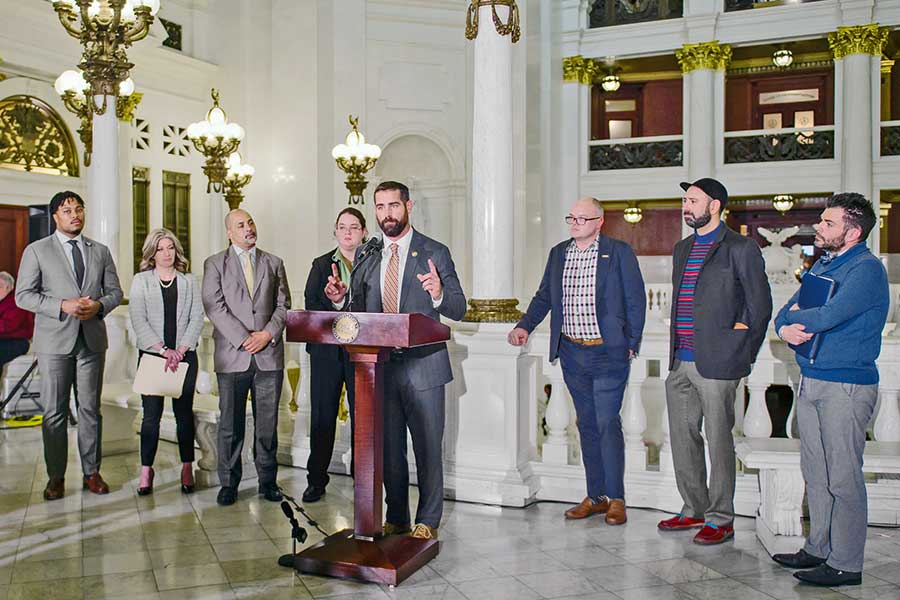State Rep. Brian Sims (D-Phila.) hosted a news conference Wednesday in Harrisburg about banning conversion therapy for minors in Pennsylvania.
Washington, D.C. and 18 states including New Jersey, Delaware and Maryland have banned conversion therapy for minors. Only 11 cities in Pennsylvania, including Philadelphia, Pittsburgh, Allentown, Doylestown and Reading, have outlawed the practice.
On Oct. 21, Sims was joined by state Rep. Malcolm Kenyatta (D-Phila.), state Sen. Katie Muth, Daniel Walinksy, associate professor in the counseling psychology program at Temple University, Todd Snovel, executive director of Pennsylvania Commission on LGBTQ Affairs and Casey Pick and Troy Stevenson from the Trevor Project to discuss pending legislation prohibiting mental health professionals from performing conversion therapy on those under age 18 — H.B. 1293 and S.B. 56. The bills are “sitting in committee,” Muth said. State Reps. Chris Raab and Dan Frankel also attended.
A study from The Williams Insititute estimates that 698,000 LGBT adults in the United States have received conversion therapy, including 350,000 who received the treatment when they were adolescents. It also found that 6,000 LGBT youth would have received conversion therapy had their state not banned the practice.
Sims began the conference by saying, “We’re here to talk about a topic that’s very important to me, and that is the ban on what I call conversion abuse,” likening conversion therapy to child abuse.
Pick said youth who experience rejection from their families are eight times more likely to attempt suicide and “what is known as conversion therapy is probably one of the worst forms of rejection a youth can experience.”
Every year The Trevor Project hears from more than 3,500 Pennsylvania youth and “all too many of them” reach out because they have experienced or are afraid to experience conversion therapy, she added.
The Trevor Project’s recently published national survey on LGBTQ youth mental health surveyed 34,000 young people aged 13-25. When asked if they’d experienced conversion therapy, 5 percent said “yes.” When asked if anyone had tried to change their sexual orientation, the number rose to two-thirds.
For LGBTQ youth that had experienced conversion therapy, 42 percent reported a suicide attempt in the previous 12 months.
Stevenson recounted an emotional story about a time in high school when football players chased him and his partner. After they each returned to their respective homes, Stevenson called his partner, who said, “I just can’t go back. I can’t go back,” referring to where his parents had sent him after finding out his same-sex attraction. Stevenson’s partner set down the phone, and the next day Stevenson learned that his partner had died by suicide.
“That’s the reality of what this does to people,” Stevenson said.
Kenyatta commended Sims for his dedication to fighting conversion therapy.
“I appreciate that you call conversion therapy exactly what it is. It is abuse. It is insidious. It is harmful. It has lifelong effects,” said Kenyatta, who is on a task force spearheaded by Gov. Tom Wolf about suicide prevention. “One of the things that we know is that death by suicide is the second leading cause of death for our young people after only accidental death,” he added. “We are losing our young people at rates that are unacceptable and this type of abuse is causing even more of our young people to be left with scars that will be with them for their entire lives.”
Kenyatta offered his own personal anecdote about coming out: “I grew up in a very conservative Black church. And I remember how many Sundays I stayed at the alter praying that God would change me, praying that I would be somebody different, that I could be normal. But the reality is I am normal.”
“We need more examples for our young people that who you are, your lived experience, matters and that no matter what you hear, you are going to be OK,” he added. “You deserve to live in your fullness, and we have to ensure that practices like conversion therapy are banned in the Commonwealth.”
Professional and medical organizations including the American Psychological Association, Psychiatric Association, Academy of Pediatrics and the National Association of Social Workers have opposed conversion therapy, according to Muth, who added the practice isn’t clinically tested.
In Pennsylvania, we need to have this be a place of acceptance and respect for all,” she added. “We cannot allow these practices to continue to shame people for who they love, how they identify or for being who they are.”
Sims concluded the conference on an emotional final note, “If you’re an LGBTQ+ kid … and anybody is telling you that you are wrong, I want to tell you that not only do we know that you are right, science knows your right, medicine knows that you are right. …You are surrounded by friends, family and allies, and anybody telling you otherwise is wrong. We are here to protect you, and we are here to respect you.”

